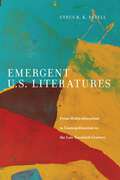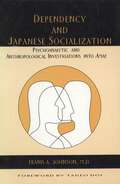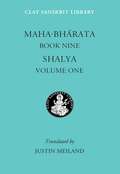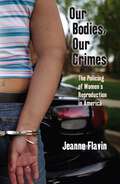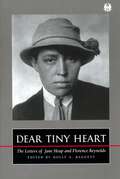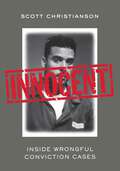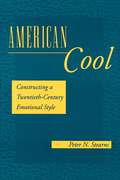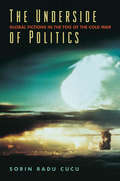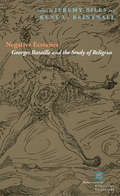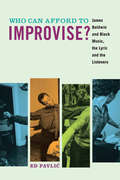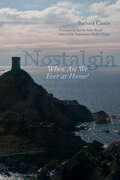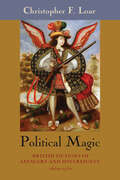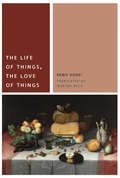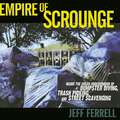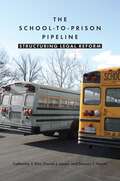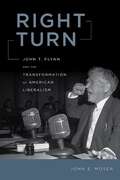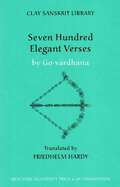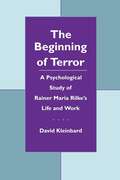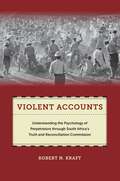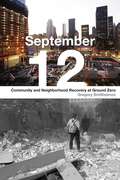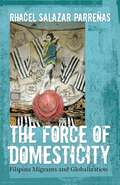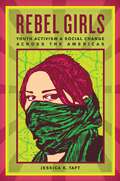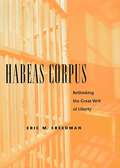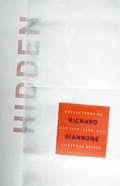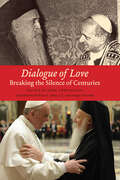- Table View
- List View
Emergent U.S. Literatures: From Multiculturalism to Cosmopolitanism in the Late Twentieth Century
by Cyrus PatellEmergent U.S. Literatures introduces readers to the foundational writers and texts produced by four literary traditions associated with late-twentieth-century US multiculturalism. Examining writing by Native Americans, Hispanic Americans, Asian Americans, and gay and lesbian Americans after 1968, Cyrus R. K. Patell compares and historicizes what might be characterized as the minority literatures within “U.S. minority literature.” Drawing on recent theories of cosmopolitanism, Patell presents methods for mapping the overlapping concerns of the texts and authors of these literatures during the late twentieth century. He discusses the ways in which literary marginalization and cultural hybridity combine to create the grounds for literature that is truly “emergent” in Raymond Williams’s sense of the term—literature that produces “new meanings and values, new practices, new relationships and kinds of relationships” in tension with the dominant, mainstream culture of the United States. By enabling us to see the American literary canon through the prism of hybrid identities and cultures, these texts require us to reevaluate what it means to write (and read) in the American grain. Emergent U.S. Literatures gives readers a sense of how these foundational texts work as aesthetic objects—rather than merely as sociological documents—crafted in dialogue with the canonical tradition of so-called “American Literature,” as it existed in the late twentieth century, as well as in dialogue with each other.
Dependency and Japanese Socialization: Psychoanalytic and Anthropological Investigations in Amae
by Frank A. Johnson"Surprisingly readable and studded with nuggets of insight."-The Daily Yomiuri "This insightful, well-written, fascinating book offers new understandings, not only of Japan, but also of American culture. It is essential for those in anthropology, psychology, sociology, and psychiatry who are interested in culture, as well as those in law and the business community who deal with Japan."-Paul Ekman, Ph.D.,Director, Human Interaction Laboratory, Langley Porter Institute, University of California, San Francisco "[A] thoughtful cross-cultural study of development...His work can only enhance the still evolving psychoanalytic theory of preoedipal development as it is being derived mostly from psychoanalytic research on child-parent interaction in American families."-Calvin F. Settlage, M.D. "Johnson's ambitious and exhaustive synthesis of anthropological and psychological treatments of dependency raises interesting questions. . . Johnson alerts the reader to issues of universalism and relativity and leads us to ask, 'What would psychoanalysis be like, if it had originated in Japan?'"-Merry I. White, Edwin O. Reischauer Institute of Japanese Studies, Harvard University ". . . Johnson's erudite and critical re-examination of human dependence succeeds to re-profile dependence meaningfully and revives our interest in this major aspect of human experience. Indeed, much food for thought for both psychoanalysts and anthropologists."-Henri Parens, M.D., Philadelphia Psychoanalytic Institute Western ideologies traditionally emphasize the concepts of individualism, privacy, freedom, and independence, while the prevailing ethos relegates dependency to a disparaged status. In Japanese society, the divergence from these western ideals can be found in the concept of amae (perhaps best translated as indulgent dependency) which is part of the Japanese social fiber and pervades their experience. For the Western reader, the concept of amae is somewhat alien and unfamiliar, but in order to understand the Japanese fully, it is essential to acquire a familiarity with the intensity that accompanies interdependent affiliations within their culture. To place amae in the proper context, Johnson critically examines the western attitudes toward dependency from the perspectives of psychoanalysis, psychiatry, developmental psychology, and anthropology. Johnson traces the development of the concept and uses of the term dependency in academic and developmental psychology in the West, including its recent eclipse by more operationally useful terms attachment and interdependency. This timely books makes use of the work of Japanese psychiatrist Takeo Doi, whose book The Anatomy of Dependence introduced the concept of amae to the West. Johnson goes on to illuminate the collective manner in which Japanese think and behave which is central to their socialization and educational practices, especially as seen in the stunning success of Japanese trading practices during the past twenty years. A major emphasis is placed upon the positive aspects of amae, which are compared and contrasted with attitudes toward dependency seen among other nationalities, cultures, and groups in both Western and Asian societies. Complete with a glossary of Japanese terms, Dependency and Japanese Socialization provides a comprehensive investigation into Japanese behavior.
Mahabharata Book Nine: Shalya (Clay Sanskrit Library #4)
by Justin MeilandThe Book of Shalya recounts in gory detail the final destruction of the Káurava army and the defeat of its leader, Dur·yódhana. In this first volume heroic duels and martial speeches abound as Shalya, the king of the Madras, is made general of the Káurava army, only to be slaughtered in his turn.The Book of Shalya recounts in gory detail the final destruction of the Káurava army and the defeat of its leader, Duryódhana. In this first volume heroic duels and martial speeches abound as Shalya, the king of the Madras, is made general of the Káurava army, only to be slaughtered in his turn.Co-published by New York University Press and the JJC FoundationFor more on this title and other titles in the Clay Sanskrit series, please visit http://www.claysanskritlibrary.org
Our Bodies, Our Crimes: The Policing of Women’s Reproduction in America (Alternative Criminology #16)
by Jeanne FlavinWinner of the 2010 Distinguished Book Award from the American Sociological Association; Sex and Gender Section2009 Choice Outstanding Academic TitleAn important work documenting how the criminal justice system polices women's reproductive capacityThe intense policing of women’s reproductive capacity places women’s health and human rights in great peril. Poor women are pressured to undergo sterilization. Women addicted to illicit drugs risk arrest for carrying their pregnancies to term. Courts, child welfare, and law enforcement agencies fail to recognize the efforts of battered and incarcerated women to care for their children. Pregnant inmates are subject to inhumane practices such as shackling during labor and poor prenatal care. And decades after Roe, the criminalization of certain procedures and regulation of abortion providers still obstruct women’s access to safe and private abortions.In this important work, Jeanne Flavin looks beyond abortion to document how the law and the criminal justice system police women’s rights to conceive, to be pregnant, and to raise their children. Through vivid and disturbing case studies, Flavin shows how the state seeks to establish what a “good woman” and “fit mother” should look like and whose reproduction is valued. With a stirring conclusion that calls for broad-based measures that strengthen women’s economic position , choice-making, autonomy, sexual freedom, and health care, Our Bodies, Our Crimes is a battle cry for all women in their fight to be fully recognized as human beings. At its heart, this book is about the right of a woman to be a healthy and valued member of society independent of how or whether she reproduces.
Dear Tiny Heart: The Letters of Jane Heap and Florence Reynolds (The Cutting Edge: Lesbian Life and Literature Series)
by Holly BaggettWriter, artist, Manhattan gallery owner, and co-editor of the Little Review, Jane Heap was one of the most dynamic figures of the international avant garde, creating a life that defined the "modernist experience" as a syncretic one. Deliberately seeking a low profile throughout her life, Heap has frustrated many scholars interested in her personal life and the extraordinarily vital period in which she lived. Through her correspondence, Heap here reveals her intimate self as well as her more public, creative relationships with some of the legends of modern art, literature, and spirituality. Focusing primarily on the voluminous letters written by Heap to Florence Reynolds, the correspondence included in this volume spans the years from 1908-1949, incorporating additional illuminating letters to Reynolds from other significant figures in Heap's life. Heap's letters reveal the radical transformation of a dreamy, young Midwestern woman into a forceful, sophisticated arbiter of international modernism and provide rare insight into the struggle for lesbian identity and community during the inter-war period. They detail her eventual abandonment of art in the search for the transcendent in the seductive and esoteric mysticism of George Gurdjieff. Holly Baggett's accompanying essay further highlights the boldness of Jane Heap's aesthetics and life.
Innocent: Inside Wrongful Conviction Cases
by Scott ChristiansonInnocent graphically documents forty-two recent criminal cases to find evidence of shocking miscarriages of justice, especially in murder cases. Based upon interviews with more than 200 people and reviews of hundreds internal case files, court records, smoking-gun memoranda, and other documents, Scott Christianson gets inside the legal cases, revealing the mistakes, abuses, and underlying factors that led to miscarriages of justice, while also describing how determined prisoners, post-conviction attorneys, advocates, and journalists struggle against tremendous odds to try to win their exonerations.The result is a powerful work that recounts the human costs of a criminal justice system gone awry, and shows us how wrongful convictions can—and do—happen everywhere.
American Cool: Constructing a Twentieth-Century Emotional Style
by Peter N. StearnsCool. The concept has distinctly American qualities and it permeates almost every aspect of contemporary American culture. From Kool cigarettes and the Peanuts cartoon's Joe Cool to West Side Story (Keep cool, boy.) and urban slang (Be cool. Chill out.), the idea of cool, in its many manifestations, has seized a central place in our vocabulary. Where did this preoccupation with cool come from? How was Victorian culture, seemingly so ensconced, replaced with the current emotional status quo? From whence came American Cool? These are the questions Peter Stearns seeks to answer in this timely and engaging volume. American Cool focuses extensively on the transition decades, from the erosion of Victorianism in the 1920s to the solidification of a cool culture in the 1960s. Beyond describing the characteristics of the new directions and how they altered or amended earlier standards, the book seeks to explain why the change occurred. It then assesses some of the outcomes and longer-range consequences of this transformation.
The Underside of Politics: Global Fictions in the Fog of the Cold War
by Sorin Radu CucuThis book argues that during the Cold War modern political imagination was held captive by the split between two visions of universality—freedom in the West versus social justice in the East—and by a culture of secrecy that tied national identity to national security. Examining post- 1945 American and Eastern European interpretive novels in dialogue with each other and with postfoundational democratic theory, The Underside of Politics brings to light the ideas, forces, and circumstances that shattered modernity’s promises (such as secularization, autonomy, and rights) on both sides of the Iron Curtain. In this context, literary fictions by Kundera and Roth, Popescu and Coover, Kiš and DeLillo become global as they reveal the trials of popular sovereignty in the “fog of the Cold War” and trace the elements around which its world discourse or global picture is constructed: the atom bomb, Stalinist show trials, anticommunist propaganda, totalitarian terror, secret military operations, and political targeting.
Negative Ecstasies: Georges Bataille and the Study of Religion (Perspectives in Continental Philosophy)
by Jeremy Biles and Kent L. BrintnallDespite Georges Bataille’s acknowledged influence on major poststructuralist thinkers—including Foucault, Derrida, Kristeva, Lacan, Baudrillard, and Barthes—and his prominence in literary, cultural, and social theory, rarely has he been taken up by scholars of religion, even as issues of the sacred were central to his thinking. Bringing together established scholars and emerging voices, Negative Ecstasies engages Bataille from the perspective of religious studies and theology, forging links with feminist and queer theory, economics, secularism, psychoanalysis, fat studies, and ethics. As these essays demonstrate, Bataille’s work bears significance to contemporary questions in the academy and vital issues in the world. We continue to ignore him at our peril.
Who Can Afford to Improvise?: James Baldwin and Black Music, the Lyric and the Listeners
by Ed PavlićMore than a quarter-century after his death, James Baldwin remains an unparalleled figure in American literature and African American cultural politics. In Who Can Afford to Improvise? Ed Pavlić offers an unconventional, lyrical, and accessible meditation on the life, writings, and legacy of James Baldwin and their relationship to the lyric tradition in black music, from gospel and blues to jazz and R&B. Based on unprecedented access to private correspondence, unpublished manuscripts and attuned to a musically inclined poet’s skill in close listening, Who Can Afford to Improvise? frames a new narrative of James Baldwin’s work and life. The route retraces the full arc of Baldwin’s passage across the pages and stages of his career according to his constant interactions with black musical styles, recordings, and musicians.Presented in three books — or movements — the first listens to Baldwin, in the initial months of his most intense visibility in May 1963 and the publication of The Fire Next Time. It introduces the key terms of his lyrical aesthetic and identifies the shifting contours of Baldwin’s career from his early work as a reviewer for left-leaning journals in the 1940s to his last published and unpublished works from the mid-1980s. Book II listens with Baldwin and ruminates on the recorded performances of Billie Holiday and Dinah Washington, singers whose message and methods were closely related to his developing world view. It concludes with the first detailed account of “The Hallelujah Chorus,” a performance from July 1, 1973, in which Baldwin shared the stage at Carnegie Hall with Ray Charles. Finally, in Book III, Pavlić reverses our musically inflected reconsideration of Baldwin’s voice, projecting it into the contemporary moment and reading its impact on everything from the music of Amy Winehouse, to the street performances of Turf Feinz, and the fire of racial oppression and militarization against black Americans in the 21st century.Always with an ear close to the music, and avoiding the safe box of celebration, Who Can Afford to Improvise? enables a new kind of “lyrical travel” with the instructive clarity and the open-ended mystery Baldwin’s work invokes into the world.
Nostalgia: When Are We Ever at Home?
by Barbara CassinWinner, French Voices Grand PrizeNostalgia makes claims on us both as individuals and as members of a political community. In this short book, Barbara Cassin provides an eloquent and sophisticated treatment of exile and of desire for a homeland, while showing how it has been possible for many to reimagine home in terms of language rather than territory.Moving from Homer’s and Virgil’s foundational accounts of nostalgia to the exilic writings of Hannah Arendt, Cassin revisits the dangerous implications of nostalgia for land and homeland, thinking them anew through questions of exile and language. Ultimately, Cassin shows how contemporary philosophy opens up the political stakes of rootedness and uprootedness, belonging and foreignness, helping us to reimagine our relations to others in a global and plurilingual world.
Political Magic: British Fictions of Savagery and Sovereignty, 1650-1750
by Christopher F. LoarPolitical Magic examines early modern British fictions of exploration and colonialism, arguing that narratives of intercultural contact reimagine ideas of sovereignty and popular power. These fictions reveal aspects of political thought in this period that official discourse typically shunted aside, particularly the political status of the commoner, whose “liberty” was often proclaimed even as it was undermined both in theory and in practice. Like the Hobbesian sovereign, the colonist appears to the colonized as a giver of rules who remains unruly.At the heart of many texts are moments of savage wonder, provoked by European displays of technological prowess. In particular, the trope of the first gunshot articulates an origin of consent and political legitimacy in colonial showmanship. Yet as manifestations of force held in abeyance, these technologies also signal the ultimate reliance of sovereigns on extreme violence as the lessthan-mystical foundation of their authority.By examining works by Cavendish, Defoe, Behn, Swift, and Haywood in conjunction with contemporary political writing and travelogues, Political Magic locates a subterranean discourse of sovereignty in the century after Hobbes, finding surprising affinities between the government of “savages” and of Britons.
The Life of Things, the Love of Things (Commonalities)
by Remo BodeiFrom prehistoric stone tools, to machines, to computers, things have traveled a long road along with human beings. Changing with the times, places, and methods of their production, emerging from diverse histories, and enveloped in multiple layers of meaning, things embody ideas, emotions, and symbols of which we are often unaware.The meaning of “thing” is richer than that of “object,” which is something that is manipulated with indifference or according to impersonal technical procedures.Things also differ from merchandise, objects that can be sold or exchanged or seen as status symbols. Things, in the philosophical sense, are nodes of relationships with the life of others, chains of continuity among generations, bridges that connect individual and collective histories, junctions between human civilizations and nature.Things incite us to listen to reality, to make them part of ourselves, giving fresh life to an otherwise suffocating interiority. Things also reveal the hidden aspect of a “subject” in its most secret and least explored side. Things are the repositories of ideas, emotions, and symbols whose meaning we often do not understand.In an unexpected but coherent journey that includes the visions of classic philosophers from Aristotle to Husserl and from Hegel to Heidegger, along with the analysis of works of art, Bodei addresses issues such as fetishism, the memory of things, the emergence of department stores, consumerism, nostalgia for the past, the self-portraits of Rembrandt and Dutch still-lifes of the seventeenth century. The more we are able to recover objects in their wealth of meanings and integrate them into our mental and emotional horizons, he argues, the broader and deeper our world becomes.
Empire of Scrounge: Inside the Urban Underground of Dumpster Diving, Trash Picking, and Street Scavenging (Alternative Criminology #22)
by Jeff FerrellAn illuminating and personal journey through Jeff Ferrell's eight month odyssey of living off the streets“Patrolling the neighborhoods of central Fort Worth, sorting through trash piles, exploring dumpsters, scanning the streets and the gutters for items lost or discarded, I gathered the city's degraded bounty, then returned home to sort and catalogue the take.”—from the IntroductionIn December of 2001 Jeff Ferrell quit his job as tenured professor, moved back to his hometown of Fort Worth, Texas, and, with a place to live but no real income, began an eight-month odyssey of essentially living off of the street. Empire of Scrounge tells the story of this unusual journey into the often illicit worlds of scrounging, recycling, and second-hand living. Existing as a dumpster diver and trash picker, Ferrell adopted a way of life that was both field research and free-form survival. Riding around on his scrounged BMX bicycle, Ferrell investigated the million-dollar mansions, working-class neighborhoods, middle class suburbs, industrial and commercial strips, and the large downtown area, where he found countless discarded treasures, from unopened presents and new clothes to scrap metal and even food.Richly illustrated throughout, Empire of Scrounge is both a personal journey and a larger tale about the changing values of American society. Perhaps nowhere else do the fault lines of inequality get reflected so clearly than at the curbside trash can, where one person's garbage often becomes another's bounty. Throughout this engaging narrative, full of a colorful cast of characters, from the mansion living suburbanites to the junk haulers themselves, Ferrell makes a persuasive argument about the dangers of over-consumption. With landfills overflowing, today’s highly disposable culture produces more trash than ever before—and yet the urge to consume seems limitless.In the end, while picking through the city's trash was often dirty and unpleasant work, unearthing other people's discards proved to be unquestionably illuminating. After all, what we throw away says more about us than what we keep.
The School-to-Prison Pipeline: Structuring Legal Reform
by Catherine Y. Kim Daniel J. Losen Damon T. HewittAn in-depth analysis of the legal entry points and remedies in the school-to-prison pipelineThe “school-to-prison pipeline” is an emerging trend that pushes large numbers of at-risk youth—particularly children of color—out of classrooms and into the juvenile justice system. The policies and practices that contribute to this trend can be seen as a pipeline with many entry points, from under-resourced K-12 public schools, to the over-use of zero-tolerance suspensions and expulsions and to the explosion of policing and arrests in public schools. The confluence of these practices threatens to prepare an entire generation of children for a future of incarceration.In this comprehensive study of the relationship between American law and the school-to-prison pipeline, co-authors Catherine Y. Kim, Daniel J. Losen, and Damon T. Hewitt analyze the current state of the law for each entry point on the pipeline and propose legal theories and remedies to challenge them. Using specific state-based examples and case studies, the authors assert that law can be an effective weapon in the struggle to reduce the number of children caught in the pipeline, address the devastating consequences of the pipeline on families and communities, and ensure that our public schools and juvenile justice system further the goals for which they were created: to provide meaningful, safe opportunities for all the nation’s children.
Right Turn: John T. Flynn and the Transformation of American Liberalism
by John E. MoserJohn T. Flynn, a prolific writer, columnist for the New Republic, Harper's Magazine, and Collier's Weekly, radio commentator, and political activist, was described by the New York Times in 1964 as “a man of wide-ranging contradictions.” In this new biography of Flynn, John E. Moser fleshes out his many contradictions and profound influence on U.S. history and political discourse.In the 1930s, Flynn advocated extensive regulation of the economy, the breakup of holding companies, and heavy taxes on the wealthy. A mere fifteen years later he was denouncing the New Deal as “creeping socialism,” calling for an abolition of the income tax, and hailing Senator Joseph McCarthy and his fellow anticommunists as saviors of the American Republic. Yet throughout his career he insisted that he had remained true to the principles of liberalism as he understood them.It was America's political culture that changed, he argued, and not his values and views. Drawing on Flynn’s life and his prolific writings, Moser illuminates how liberalism in America changed during the mid-twentieth century and considers whether Flynn’s ideological odyssey was the product of opportunism, or the result of a set of deep-seated principles that he championed consistently over the years. In addition, Right Turn examines Flynn’s role in laying the foundations for the “culture war” that would be played out in American society for the rest of the century, helping to define modern American conservatism.
Seven Hundred Elegant Verses (Clay Sanskrit Library #32)
by GovardhanaWhen Go·várdhana composed his "Seven Hundred Elegant Verses" in Sanskrit in the twelfth century CE, the title suggested that this was a response to the 700 verses in the more demotic Prakrit language traditionally attributed to King Hala, composed almost a thousand years earlier. Both sets of poems were composed in the arya metre. Besides being the name of a metre, in Sanskrit arya means a noble or elegant lady, and Go·várdhana wished to reflect and appeal to a sophisticated culture. These poems each consist of a single stanza, almost as condensed and allusive as a Japanese haiku. They cover the gamut of human life and emotion, though the favorite topic is love in all its aspects.Co-published by New York University Press and the JJC FoundationFor more on this title and other titles in the Clay Sanskrit series, please visit http://www.claysanskritlibrary.org
The Beginning of Terror: A Psychological Study of Rainer Maria Rilke's Life and Work
by David KleinbardThe insights here are of such depth, and contain such beauty in them, that time and again the reader must pause for breath. At last Rilke has met a critic whose insight, courage, and humanity are worthy of his life and work."-Leslie Epstein Director, Graduate Creative Writing Program, Boston University "[A] well-reasoned, fairly fascinating, and illuminating study which soundly and convincingly applies Freudian and particularly post-Freudian insights into the self, to Rilke's life and work, in a way which enlightens us considerably as to the relationship between life and work in original ways. Kleinbard takes off where Hugo Simenauer's monumental psycho- biography of Rilke (1953) left off. . . . He succeeds in giving us a psychic portrait of the poet which is more illuminating and which . . . does greater justice to its subject than any of his predecessors.. . . . Any reader with strong interest in Rilke would certainly welcome the availability of this study."-Walter H. Sokel,Commonwealth Professor of German and English Literatures,University of Virginia. For beauty is nothing but the beginning of terror, which we are just able to bear, and we wonder at it so because it calmly disdainsto destroy us."-Rilke Beginning with Rilke's 1910 novel, The Notebooks of Malte Laurids Brigge, The Beginning of Terror examines the ways in which the poet mastered the illness that is so frightening and crippling in Malte and made the illness a resource for his art. Kleinbard goes on to explore Rilke's poetry, letters, and non-fiction prose, his childhood and marriage, and the relationship between illness and genius in the poet and his work, a subject to which Rilke returned time and again. This psychoanalytic study also defines the complex connections between Malte's and Rilke's fantasies of mental and physical fragmentation, and the poet's response to Rodin's disintegrative and re-integrative sculpture during the writing of The Notebooks and New Poems. One point of departure is the poet's sense of the origins of his illness in his childhood and, particularly, in his mother's blind, narcissistic self- absorption and his father's emotional constriction and mental limitations. Kleinbard examines the poet's struggle to purge himself of his deeply felt identification with his mother, even as he fulfilled her hopes that he become a major poet. The book also contains chapters on Rilke's relationships with Lou Andreas Salom and Aguste Rodin, who served as parental surrogates for Rilke. A psychological portrait of the early twentieth-century German poet, The Beginning of Terror explores Rilke's poetry, letters, non-fiction prose, his childhood and marriage. David Kleinbard focuses on the relationship between illness and genius in the poet and his work, a subject to which Rilke returned time and again.
Violent Accounts: Understanding the Psychology of Perpetrators through South Africa’s Truth and Reconciliation Commission (Qualitative Studies in Psychology #9)
by Robert N. KraftViolent Accounts presents a compelling study of how ordinary people commit extraordinary acts of violence and how perpetrators and victims manage in the aftermath. Grounded in extensive, qualitative analysis of perpetrator testimony, the volume reveals the individual experiences of perpetrators as well as general patterns of influence that lead to collective violence. Drawing on public testimony from the amnesty hearings of the South African Truth and Reconciliation Commission, the book interweaves hundreds of hours of testimony from seventy-four violent perpetrators in apartheid South Africa, including twelve major cases that involved direct interactions between victims and perpetrators. The analysis of perpetrator testimony covers all tiers on the hierarchy of organized violence, from executives who translated political doctrine into general strategies, to managers who translated these general strategies into specific plans, to the staff—the foot soldiers—who carried out the destructive plans of these managers. Vivid and accessible, Violent Accounts is a work of innovative scholarship that transcends the particulars of the Truth and Reconciliation Commission to reveal broader themes and unexpected insights about perpetrators of collective violence, the confrontations between victims and perpetrators in the aftermath of this violence, the reality of multiple truths, the complexities of reconciliation, and lessons of restorative justice.
September 12: Community and Neighborhood Recovery at Ground Zero
by Gregory SmithsimonThe collapse of the World Trade Center shattered windows across the street in Battery Park City, throwing the neighborhood into darkness and smothering homes in debris. Residents fled. In the months and years after they returned, they worked to restore their community. Until September 11, Battery Park City had been a secluded, wealthy enclave just west Wall Street, one with all the opulence of the surrounding corporate headquarters yet with a gated, suburban feel. After the towers fell it became the most visible neighborhood in New York. This ethnography of an elite planned community near the heart of New York City’s financial district examines both the struggles and shortcomings of one of the city’s wealthiest neighborhoods. In doing so, September 12 discovers the vibrant exclusivity that makes Battery Park City an unmatched place to live for the few who can gain entry. Focusing on both the global forces that shape local landscapes and the exclusion that segregates American urban development, Smithsimon shows the tensions at work as the neighborhood’s residents mobilized to influence reconstruction plans. September 12 reveals previously unseen conflicts over the redevelopment of Lower Manhattan, providing a new understanding of the ongoing, reciprocal relationship between social conflicts and the spaces they both inhabit and create.
The Force of Domesticity: Filipina Migrants and Globalization (Nation of Nations #26)
by Rhacel Salazar ParrenasTaking as her subjects migrant Filipina domestic workers in Rome and Los Angeles, transnational migrant families in the Philippines, and Filipina migrant entertainers in Tokyo, Parreñas documents the social, cultural, and political pressures that maintain women’s domesticity in migration, as well as the ways migrant women and their children negotiate these adversities.Parreñas examines the underlying constructions of gender in neoliberal state regimes, export-oriented economies such as that of the Philippines, protective migration laws, and the actions and decisions of migrant Filipino women in maintaining families and communities, raising questions about gender relations, the status of women in globalization, and the meanings of greater consumptive power that migration garners for women. The Force of Domesticity starkly illustrates how the operation of globalization enforces notions of women’s domesticity and creates contradictory messages about women’s place in society, simultaneously pushing women inside and outside the home.
Rebel Girls: Youth Activism and Social Change Across the Americas
by Jessica K. TaftExplores how teenage girls across the world—Mexico City, Vancouver, Buenos Aires, San Francisco—reject the patriarchy and redefine their girlhood to claim their political authority and become activistsFrom anti-war walkouts to anarchist youth newspapers, rallies against educational privatization, and workshops on fair trade, teenage girls are active participants and leaders in a variety of social movements. Rebel Girls: Youth Activism and Social Change Across the Americas illuminates the experiences and perspectives of these uniquely positioned agents of social change. Jessica K. Taft introduces readers to a diverse and vibrant transnational community of teenage girl activists in the San Francisco Bay Area, Mexico City, Caracas, Buenos Aires, and Vancouver. Expansive in scope and full of rich details, Taft brings to life the voices of these inspiring activists who are engaged in innovative and effective organizing for global and local social justice, highlighting their important contributions to contemporary social movements and social theory.Rebel Girls explores how teenage girls construct activist identities, rejecting and redefining girlhood and claiming political authority for youth in the process. Taft examines the girl activists’ social movement strategies and collective political practices, detailing their shared commitments to process-based political education, participatory democracy, and hopeful enthusiasm. Ultimately, Rebel Girls has substantial implications for social movements and youth organizations, arguing that adult social movements could learn a great deal from girl activists and making clear the importance of increased collaboration between young people and adults.
Habeas Corpus: Rethinking the Great Writ of Liberty
by Eric M. FreedmanHabeas Corpus is the process by which state prisoners—particularly those on death row—appeal to federal courts to have their convictions overturned. Its proper role in our criminal justice system has always been hotly contested, especially in the wake of 1996 legislation curtailing the ability of prisoners to appeal their sentences.In this timely volume, Eric M. Freedman reexamines four of the Supreme Court’s most important habeas corpus rulings: one by Chief Justice John Marshall in 1807 concerning Aaron Burr’s conspiracy, two arising from the traumatic national events of the 1915 Leo Frank case and the 1923 cases growing out of murderous race riots in Elaine County, Arkansas, and one case from 1953 that dramatized some of the ugliest features of the Southern justice of the period. In each instance, Freeman uncovers new original sources and tells the stories of the cases through such documents as the Justices’ draft opinions and the memos of law clerk William H. Rehnquist. In bracing and accessible language, Freedman then presents an interpretation that rewrites the conventional view.Building on these results, he challenges legalistic limits on habeas corpus and demonstrates how a vigorous writ is central to implementing the fundamental conceptions of individual liberty and constrained government power that underlie the Constitution.
Hidden: Reflections on Gay Life, AIDS, and Spiritual Desire
by Richard GiannoneHidden—Richard Giannone’s searingly honest, richly insightful memoir—eloquently captures the author’s transformation from a solitary gay academic to a dedicated caregiver as well as a sexually and spiritually committed man. Always alone, always fearful, he initially resisted the duty to look after his dying female relatives. But his mother’s fall into dementia changed all that. Her vulnerability opened this middle-aged man to the love of another man, a former priest and Jersey boy like himself. Together the two men saw the old woman to her death and did the same for Giannone’s sister. In Hidden Giannone uncovers how, ultimately, these experiences moved him closer to participating in the vitality he believed pulsed in the world but had always eluded him.The mothering life of this gay partnership evolved alongside the AIDS crisis and within and against Italian American culture that reflected the Catholic Church’s discountenancing of homosexual love. Giannone vividly weaves his reflections on gay life in Greenwich Village and his spiritual journey as a gay man and Catholic into his experience of caring for the women of his family.In Hidden Giannone recounts a gripping religious conversion, drawing on the wisdom of the ancient desert mothers and fathers of Egypt and Palestine. Because he was raised a Catholic, the shift is not from nothing to something. Rather, it is away from the modeling power of institutional Christianity to the tempering influence of homosexuality on the Gospel. Gay or straight, so long as we remain hidden from ourselves, the true God remains hidden from us.
Dialogue of Love: Breaking the Silence of Centuries (Orthodox Christianity and Contemporary Thought)
by John ChryssavgisIn 1964, a little-noticed albeit pioneering encounter in the Holy Land between the heads of the Roman Catholic Church and the Orthodox Church spawned numerous contacts and diverse openings between the two “sister churches,” which had not communicated with each other for centuries.Fifty years later, Pope Francis and Ecumenical Patriarch Bartholomew meet in Jerusalem to commemorate that historical event and celebrate the close relations that have developed through mutual exchanges of formal visits and an official theological dialogue that began in 1980. This book contains three unique chapters: The first is a sketch of the behind-the-scenes challenges and negotiations that accompanied the meeting in 1964, detailing the immediate consequences of the event and setting the tone for the volume. The second is an inspirational account, interwoven with a scholarly evaluation of the work of the North American Standing Council on Orthodox/Catholic relations over the past decades. The third chapter presents a recently discovered reflection on the meeting that took place fifty years ago by one of the most important Orthodox theologians of the twentieth century, expressing cautious optimism about the future of Christian unity.
